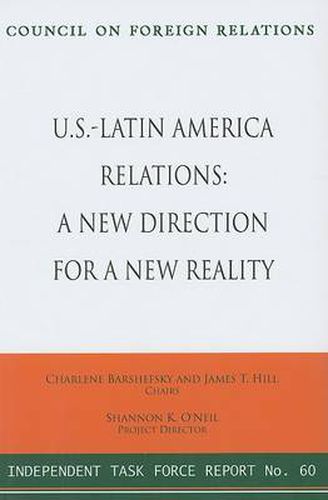Readings Newsletter
Become a Readings Member to make your shopping experience even easier.
Sign in or sign up for free!
You’re not far away from qualifying for FREE standard shipping within Australia
You’ve qualified for FREE standard shipping within Australia
The cart is loading…






The last time the United States undertook a major shift in its approach toward Latin America was when the cold war ended. It replaced policies to contain communism with ones that emphasized strengthening democracy and liberalizing state-dominated economies through expanding trade. Security concerns shifted too, from neutralizing armed leftist groups and their supporters to containing the threat of illegal drugs. Until recently, these three pillars of U.S. policy - promoting democracy, opening markets, and stemming the flow of cocaine - have remained remarkably consistent and enjoyed largely bipartisan support.Recent developments in Latin America, including a historic transition from military-authoritarian rule to democratic politics, present an opportunity for the United States to again rethink its traditional approach to the region. Led by former U.S. trade representative Charlene Barshefsky and James T. Tom Hill, former commander-in-chief of the U.S. Southern Command, the Task Force sets out a series of recommendations for U.S. policy toward Latin America. This report addresses such critical issues as poverty and inequality, the hemisphere’s energy potential, human mobility and migration, and security.
$9.00 standard shipping within Australia
FREE standard shipping within Australia for orders over $100.00
Express & International shipping calculated at checkout
The last time the United States undertook a major shift in its approach toward Latin America was when the cold war ended. It replaced policies to contain communism with ones that emphasized strengthening democracy and liberalizing state-dominated economies through expanding trade. Security concerns shifted too, from neutralizing armed leftist groups and their supporters to containing the threat of illegal drugs. Until recently, these three pillars of U.S. policy - promoting democracy, opening markets, and stemming the flow of cocaine - have remained remarkably consistent and enjoyed largely bipartisan support.Recent developments in Latin America, including a historic transition from military-authoritarian rule to democratic politics, present an opportunity for the United States to again rethink its traditional approach to the region. Led by former U.S. trade representative Charlene Barshefsky and James T. Tom Hill, former commander-in-chief of the U.S. Southern Command, the Task Force sets out a series of recommendations for U.S. policy toward Latin America. This report addresses such critical issues as poverty and inequality, the hemisphere’s energy potential, human mobility and migration, and security.